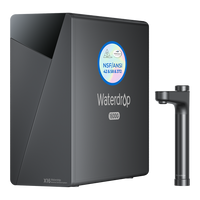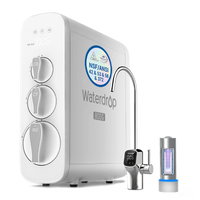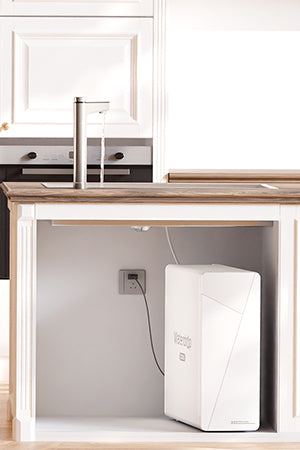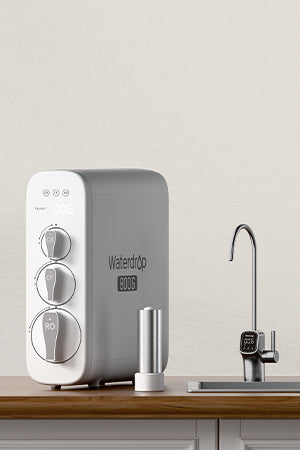Les plus grandes entreprises de boissons ont amassé leur fortune grâce à l’eau en bouteille
L'eau du robinet est l'alternative la plus sûre. Bien qu'il ait été démontré que l'eau du robinet contient
des contaminants dangereux, des études ont également montré que
l'eau en bouteille est tout aussi dangereuse. Obtenir une eau potable saine
L'eau reste l'une des principales préoccupations de nombreux propriétaires, avec une variété d'unités conçues pour s'adapter à chaque
budget.
Lorsque vous avez besoin de l'approche la plus rentable pour la filtration de l'eau, il existe
plusieurs frappeurs puissants que vous ne voudrez pas manquer :
Waterdrop , ZeroWater et Brita, qui sont trois des pompes à gravité les plus populaires
Pichets filtrants disponibles. Mais au-delà des premières impressions, comparant le filtre à eau Brita à celui de la Zero
Filtre à eau vs filtre à goutte d'eau, chacun a ses propres caractéristiques qui les distinguent.
Tout ce que vous devez savoir
ZéroEau
Offrant une large gamme de produits de filtration d'eau, les pichets ZeroWater offrent une
Capacité de 6 à 40 tasses. Grâce à un système de filtration d'eau avancé, les unités ZeroWater comptent parmi les plus performantes.
Solutions de pointe pour la filtration de l'eau dans les camping-cars, les résidences et les bâtiments commerciaux. Avec diverses certifications.
et des fonctionnalités uniques, il existe certainement une solution de filtre à eau adaptée à vos besoins.
Brita
Bien connu pour ses produits de filtration d'eau haut de gamme, Brita fournit des produits décents
Conçu pour filtrer l'eau du robinet. Des systèmes de filtration pour robinet aux bouteilles d'eau filtrée, Brita propose une variété de
Des solutions adaptées aux besoins de chacun et de chaque foyer. Chacun de leurs filtres à eau élimine une grande partie des
contaminants responsables de la mauvaise odeur et du mauvais goût de l’eau du robinet.
En tant que première marque mondiale de purification de l'eau, Waterdrop se consacre à
Nous proposons des solutions de filtration d'eau de haute qualité. Basée en Californie, aux États-Unis, Waterdrop s'efforce de fournir
les solutions de purification d’eau les plus avancées du marché, pour répondre aux besoins des ménages du monde entier.
Les pichets à eau de Waterdrop sont également certifiés NSF, ce qui, en plus d'éliminer les contaminants dangereux,
La plupart des carafes à eau sont dépourvues de filtre. Grâce à leur conception efficace, chaque carafe offre un débit rapide.
à travers plusieurs étapes de filtration, pour des performances optimales.
Comparaison des filtres Waterdrop, ZeroWater et Brita
Pichet filtrant à eau Chubby Waterdrop
Pichet filtrant à eau, Chubby bleu/blanc
69,99 $ CA
Doté d'une durée de vie de cartouche allant jusqu'à 200 gallons, le filtre à eau Waterdrop Chubby
jug a positionné ses pichets comme une solution efficace et économique pour la filtration de l'eau. Le Waterdrop
Le pichet à eau est fabriqué à partir de plastique de haute qualité sans plomb et sans BPA, accentué par un beau bois
poignée. Ce pichet filtrant élimine efficacement les contaminants, notamment le fluorure, le plomb, l'arsenic, etc.
grâce à l'utilisation de charbon actif naturel et de fibres de charbon actif d'origine japonaise (ACF). NSF 42 et 372
Les certifications signifient également que les individus peuvent être assurés que le Waterdrop répond ou dépasse les normes de filtration de l'industrie
normes.
- Avantages :
- Récipient en plastique sans plomb ni BPA
- Durée de vie d'une cartouche filtrante de 200 gallons
- Indicateur de durée de vie du filtre à LED
- Inconvénients :
- Peut nécessiter des tests TDS indépendants
- Le compartiment supérieur contient la moitié de la capacité du réservoir
- Les cartouches filtrantes nécessitent une commande en ligne
Pichet filtrant ZeroWater de 10 tasses
ZeroWater prend la filtration de son eau au sérieux, ce qui est évident dans leur
Pichets. Afin d'éliminer les solides dissous totaux (SDT), ZeroWater a lancé un compteur de SDT intégré.
dans chaque pichet pour une filtration optimale. Leur conception à cinq niveaux permet d'éliminer jusqu'à 99 % de tous les
contaminants, afin de garantir des conditions optimales de filtration de l'eau. Bien que les pichets ZeroWater offrent plusieurs
Caractéristiques, mais elles ont toutes un coût. Le coût élevé de la maintenance, notamment le remplacement des filtres, rend la tâche difficile.
vendre à la plupart des ménages ayant un budget limité.
- Avantages :
- Fournit un compteur TDS
- Filtration en cinq étapes
- Inconvénients :
- Le remplacement du filtre est coûteux
- Remplacement fréquent du filtre
Pichet filtrant Brita Standard Everyday
En éliminant jusqu'à 60 contaminants différents, Brita s'est bâti une réputation
Filtration de l'eau à prix abordable. En tant que marque reconnue, on comprend aisément la place qu'occupe Brita dans les foyers.
partout dans le monde. Cependant, bien que leurs pichets soient faciles à obtenir et abordables à remplacer et à entretenir,
a un prix. Bien que leurs pichets offrent une variété de capacités, de tailles et de styles, ils manquent de filtration.
département. Bien que les carafes à eau Brita éliminent la plupart des contaminants qui influencent le goût et l'odeur, elles
ne parviennent pas à éliminer efficacement les TDS.
- Avantages :
- Solution de filtration d'eau abordable
- Cartouches filtrantes facilement disponibles
- Inconvénients :
- Incapable d'éliminer le TDS
- Remplacement fréquent du filtre
Comprendre les faits sur les filtres à eau
Alors que l'attention se porte de plus en plus sur l'eau en bouteille plutôt que filtrée,
les pichets à eau gagnent en popularité. Parfois appelés
Les filtres à eau à passage direct utilisent la gravité pour faire passer l'eau du robinet à travers une cartouche filtrante.
L'eau traverse le charbon actif, captant les contaminants à différentes étapes de filtration. En réduisant
la présence de chlore, de sulfure d'hydrogène, de zinc et plus encore améliore considérablement la saveur générale de l'eau du robinet.
Les pichets d’eau sont-ils nécessaires ?
Bien que les pichets d’eau ne soient pas nécessaires à la poursuite d’un mode de vie sain, ils
sont plutôt gratuites pour de nombreux foyers. À moins que les particuliers soient disposés à tester régulièrement l'eau du robinet,
base, ils risquent de s'exposer à des contaminants dangereux, ce qui est particulièrement vrai pour quiconque utilise
sources d'eau municipales ou naturelles. Dans ce cas, la plupart des gens préfèrent la prudence et ont recours à un
Un mode simple de purification de l'eau. Si vous envisagez une solution pour lutter contre divers contaminants,
trouvé dans l'eau du robinet, vous ne pouvez tout simplement pas vous tromper avec un pichet filtrant à eau de Zero Water, Brita ou Waterdrop,
Les filtres améliorent le goût et l'odeur de l'eau
Lors de la comparaison des meilleures carafes à eau, nous avons testé les performances de chaque marque
éliminant des contaminants tels que le chlore, le zinc et le sulfure d'hydrogène, pour n'en citer que quelques-uns. Ces résultats fournissent
nous avons obtenu une note de
saveur et d'odeurs réduites, dont trois marques ont surpassé les autres. Alors que la plupart
Les pichets ont bien réussi à éliminer les odeurs, mais l'élimination des mauvais goûts s'est avérée difficile. Zéro Eau et
Les pichets Waterdrop, en particulier, ont travaillé dur pour fournir l'eau filtrée la plus propre de nombreux concurrents de haut niveau.
Les pichets d'eau ne sont pas égaux
Localiser la marque de certification sur une carafe à eau donnée vous donnera beaucoup d'informations.
Un aperçu précis de ce qui est filtré. Aucun filtre n'est capable d'éliminer tous les contaminants, ce qui est
Il est donc utile de faire analyser votre propre eau. Si votre source d'eau est fortement contaminée par
produits pharmaceutiques, métaux, hormones et autres composés organiques volatils, vous serez en mesure de localiser les
pichet à eau approprié en comprenant diverses certifications NSF.
Comment obtenir une eau à 0 TDS
Les solides dissous totaux, également appelés TDS, sont la concentration de solides dissous
Matière organique et solides inorganiques dans un système d'eau. Cliquez ici pour
en savoir plus sur les TDS .
Système d'osmose inverse sans réservoir
Le système de filtration d'eau par osmose inverse possède une membrane semi-perméable pour
Élimine les impuretés de l'eau potable. Grâce à ses pores microscopiques de 0,0001 micron, la membrane
ne laisse passer que les molécules plus petites que la taille de ses pores.
Les molécules d’eau sont minuscules par rapport aux molécules de métaux et de sels dissous.
L'eau traverse alors la membrane, laissant derrière elle les contaminants dissous. D'où l'osmose inverse.
Le système est le moyen le plus efficace de réduire les TDS dans l’eau.
L'osmose inverse sous évier G3 P800 est équipée de membranes RO améliorées à 7 couches.
Par conséquent, le système élimine efficacement le chlore, les métaux lourds et autres contaminants de l'eau. Plus de 90 %
Ce système permet de réduire les TDS après un rinçage complet. De plus, le grand filtre du robinet vous permet de
connaître en temps réel la durée de vie du filtre, l'indice TDS et les dysfonctionnements.
En conclusion
Quel que soit le fabricant de pichet à eau que vous choisissez, vous ne pouvez pas vous tromper avec un
Solution de filtration d'eau de l'une des marques mentionnées ci-dessus. Pour ceux qui recherchent une méthode plus complète
filtration, le pichet filtrant Waterdrop est un excellent choix pour éliminer divers contaminants. Si vous avez besoin d'un
filtre à eau abordable, au prix de remplacements fréquents de cartouches filtrantes, c'est un bon compromis pour
capacités globales. Bien que les carafes à eau Brita soient plus économiques à entretenir, elles sont capables
Éliminant moins de contaminants et de TDS. Bien que les filtres de rechange soient plus faciles à obtenir, ils sont disponibles dans la plupart des cas.
des supermarchés, vous en avez pour votre argent. ZeroWater offre une variété de capacités de filtration, au prix de
Remplacements de filtres coûteux. En fin de compte, tout dépend de votre budget et de vos besoins. Un simple essai
votre source d’eau, vous serez sur la bonne voie pour prendre une décision éclairée.










































































